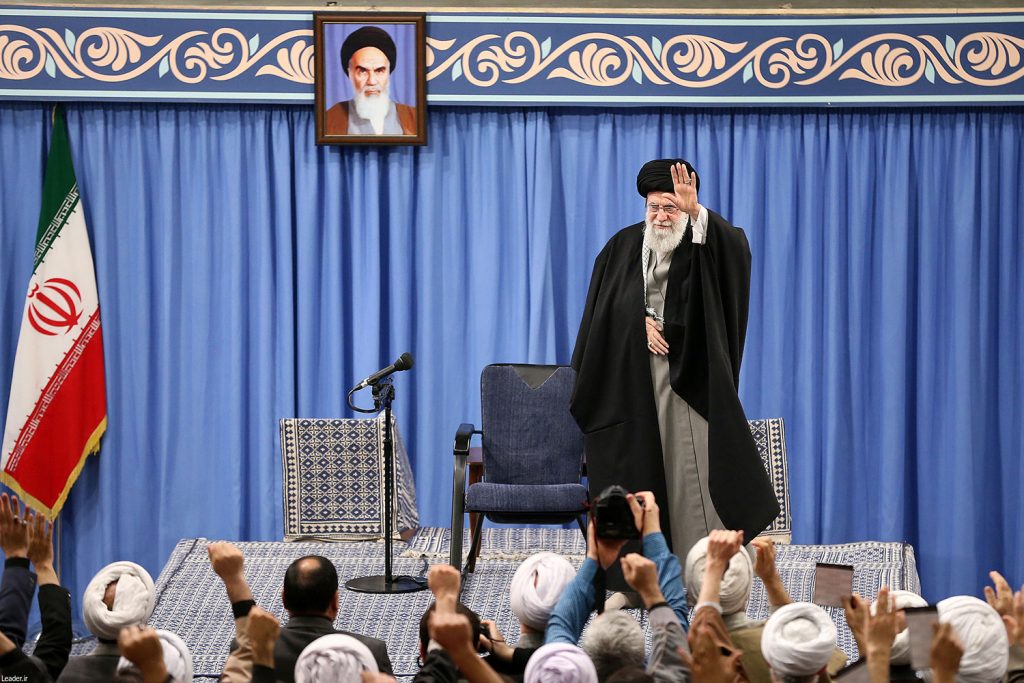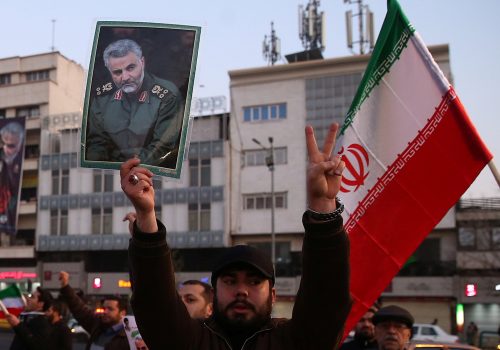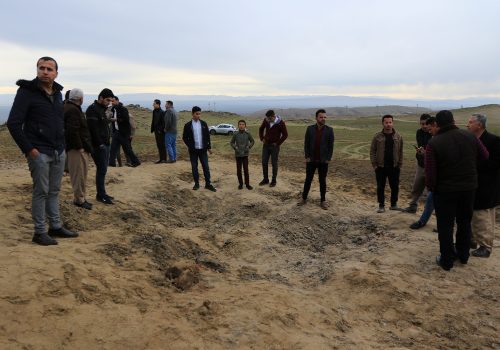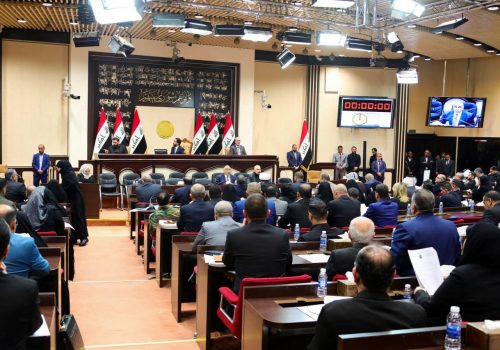Iran’s Islamic Revolutionary Guard Corps (IRGC) fired at least a dozen missiles at Iraqi military installations containing US troops early in the morning of January 8. According to US and Iraqi officials, there are no confirmed casualties among either US or Iraqi servicemembers at either the Asad or Erbil bases.
The Iranian missile attack follows the targeted strike of the IRGC’s Quds Force leader Qasem Soleimani in the early morning of January 3 by a US drone when he was leaving the Baghdad International Airport. Iranian Supreme Leader Ali Khamenei had promised that a “harsh retaliation is waiting” after the assassination.
Iranian Foreign Minister Javad Zarif tweeted shortly after the attack that “Iran took and concluded proportionate measures in self-defense under Article 51 of [the United Nations] Charter targeting base from which cowardly armed attack against our citizens and senior officials were launched.” He added that Iran does not “seek escalation or war but will defend ourselves against any aggression.” In a statement taking responsibility for the attack, the IRGC warned that if the United States launches retaliatory attacks from bases in allied countries, these states would be targets of further Iranian attacks.
US President Donald J. Trump declined to make a statement on the attacks on the night of January 7, tweeting that he would comment on January 8 and adding that “all is well!”
Atlantic Council experts react to the Iranian missile attack on Iraqi bases housing US troops:
William F. Wechsler, director of the Rafik Hariri Center and Middle East Programs at the Atlantic Council:
“After the January 8 Iranian missile attacks on Iraq, a successful tactical de-escalation requires both that the Iranian leadership intends for its military actions not to be escalatory and that the Trump administration perceives those actions as they were intended. In the absence of direct communications between the United States and Iran, however, the potential for misunderstanding and thus the risk of miscalculation remains high.
“The central US red line—the death of another American on Iranian orders— does not appear to have been crossed in this rocket attack. If that turns out to be the case, that will most likely be by design. Therefore, the Trump administration will have the opportunity to test Iranian claims that they truly do not seek any further escalation.
“Passing that test would require the Iranians not to order further military actions against the United States or against US allies in any theater, at least until this risky period is behind us, either directly like tonight’s attacks or indirectly through their proxies. It would also require the Iranian authorities to enforce command and control over those proxies and even over some elements of its own military who likely would prefer to inflict greater damage on the United States. As long as Iran is assessed to be willing and able to take these actions, then the United States should not retaliate militarily in response to this strike, not initiate new offensive military actions against Iranian forces or their proxies, and also take great care to avoid the kind of rhetoric that would risk inflaming the situation.
“If Washington and Tehran can get through this moment without a further escalation, then both might reflect that they have each achieved important key short-term objectives. The United States will have taken out two truly malign actors in a highly escalatory drone strike, but then will have not allowed the resulting crisis to spiral into war. More importantly, by doing so it will have successfully established important limits on Iranian behavior.
“From its perspective, Iran will have completely reversed its situation in Iraq in a remarkably short time. Only a few weeks ago its influence there was declining sharply—on the streets, among the Shia, and within the corridors of power. And yet now, in the immediate wake of the US drone strike, Iran stands well-positioned to have the Iraqi government expel the US military presence. If the United States is forced to withdraw from Iraq, it will also likely need to withdraw from Syria—both objectives long sought by the late General Soleimani.
“So if the immediate crisis is indeed able to pass, the Trump administration will need to quickly refocus its attention on protecting persistent US interests that remain at risk. The immediate need is for adept diplomacy to repair our strained bilateral relationship with Baghdad and prevent a forced US.military withdrawal from Iraq and Syria. This is not a time to be threatening Iraq with US sanctions. Instead the Trump administration should work to delay any impetuous Iraqi government decision and seek to re-position the United States to be seen as a supporter of Iraqi sovereignty against the biggest persistent threat to its independence, its neighbor Iran.
“Furthermore, the Trump administration, having not reacted meaningfully to previous Iranian attacks on shipping and energy production, needs to work more actively with our Gulf partners and other like-minded maritime powers to reestablish deterrence against such Iranian threats. This will be a longer-term undertaking, but needs to begin in earnest now.
“And finally—and perhaps most importantly—we need to prepare for the next easily predictable crisis with Iran, the prospect of nuclear breakout in the wake of Iran’s announcement that it will no longer observe the previously agreed limitations on its centrifuges. Addressing this challenge will likely require a US-Iranian dialogue that doesn’t presently exist. But perhaps in the wake of a successful de-escalation, there might be a new opportunity for such a dialogue to begin.”
Abbas Kadhim, director of the Iraq Initiative at the Atlantic Council:
“Iran apparently chose to use Iraq as the place of retaliation against the United States. As expected, Iran’s government hopes to fight in Iraq, not on its own soil, and preferably with its Iraqi proxies, not its own forces.
“Let’s remember that there are no US bases in Iraq. So this is an Iraqi base with Iraqi and non-Iraqi forces. Therefore, Iraq’s government must process this attack in the true meaning. It is, in essence, an attack on Iraq.
“As Iraq is not party to this conflict, nor is it in officially either camp, I expect the Iraqis to go to the United Nations Security Council to ask for international protection if the conflict escalates further. They see no logic for Iraq’s being in the middle of it.
“As UN Secretary General António Guterres said, “The world cannot afford another war in the Gulf.” So, let’s hope that this is the end of this phase of the conflict since the attacks thankfully left no casualties.”
Barbara Slavin, director of the Future of Iran Initiative at the Atlantic Council:
“We are living moment to moment as this crisis with Iran unfolds. It appears that Iran has wisely chosen to retaliate only symbolically by warning Iraq—and by extension the United States—that it was going to send missiles against bases in Iraq housing US and Iraqi forces. But even if full-scale war does not ensue, the costs of the Trump administration’s decision to unilaterally quit the Iran nuclear deal and impose a policy of maximum economic pressure on Iran without a diplomatic offramp are piling up.
“They include:
- Increasing Iranian influence in Iraq, where the US presence is already constricting and may be reduced further.
- Encouraging ISIS and other like-minded groups, which will have more freedom of maneuver in Iraq, Syria, and elsewhere, to attack Americans. (see Kenya: al Shabab).
- Forcing civil society movements in Iraq and Iran deeper underground for fear of looking like American stooges and provoking even harsher reaction against them from security forces.
- Threatening a new proliferation crisis in the Middle East as Iran revamps its nuclear program and its rivals consider their own steps in that direction.
“Some commentators this morning are talking about a Trump “win” by taking Soleimani off the battlefield without incurring a massive retaliation. This is not a football match and the lives of millions are at stake.”
Holly Dagres, nonresident fellow with the Scowcroft Center for Strategy and Security’s Middle East Security Initiative and editor of the Iran Source blog:
“Given that there was no reported loss of American life at the bases in Iraq, it seems that Tehran was establishing deterrence. An attack was imminent to save face, and it’s especially clear from the symbolism. The Iranians reportedly fired missiles around the same time Quds Force Commander Qassem Soleimani was assassinated and targeted a base where the orders were made. The ball is now in US President Donald Trump’s court.”
Thomas S. Warrick, nonresident senior fellow with the Rafik Hariri Center and Middle East Programs at the Atlantic Council:
“In the early hours of January 8, local time, Iran took responsibility for firing surface-to-surface missiles at Iraqi bases in the predominantly Sunni Anbar province and the predominantly Kurdish Irbil province. Iran was able to boast to its people that the death of Major General Qasim Soleimani, killed by a US drone strike, had been avenged.
“The battle damage assessment is underway, and initial indications have not spoken of US casualties. The death of Iraqis is, of course, a terrible thing. But if there had been significant US casualties, the world would have awoken to the dawn of a regional war, because the Trump administration would have been compelled to attack the launch sites in Iran—and probably other targets in Iran, also. If the present news holds, the situation is slightly less dangerous, if still perilous.
“The Islamic Revolutionary Guard Corps (IRGC) said on its Telegram channel that if the United States responded to this attack by bombing Iranian territory, the IRGC’s third wave would target Haifa, Israel, and Dubai.
“The world seems beyond getting outraged against Iran, which is looking at a conflict with the United States, having one of its military forces saying it fired surface-to-surface missiles from Iran against one country (Iraq) and threatening to bomb two others, including one (Dubai) where tens of thousands of Iran’s shrinking middle class go for business or leisure. Is this Iran’s peculiar sense of symmetry at work again, trying to match President Trump crazy for crazy?
“I believe President Trump intended to be provocative, not criminal, when he tweeted on January 4 that if Iran struck any Americans, he would target sites “important to Iran & the Iranian culture.” This produced a firestorm of criticism and commentary that dominated social media and cable news around the world for two days. Did the IRGC decide to post something just as crazy about attacking Dubai and Haifa just to show President Trump they could dominate the worldwide Twitterverse for a day or two?
“Questions will arise about whether Iran’s missile attack mis-fired, or whether Iran pulled off one of the most extraordinary feats of arms in the 21st Century: two deliberate near-misses that they can sell to their people as revenge against the United States, while being careful not to cross the United States’ red line that no Americans should be killed.
“In a way, a deliberate near-miss would be one of the most chilling demonstrations of Iranian military prowess imaginable, if that’s what happened. The September 14 Iranian cruise missile and rocket attack on the Saudi Arabia Abqaiq facility shocked most observers with the precision accuracy of Iranian cruise missiles and drones hitting spheroids and separation towers while leaving adjacent facilities untouched and—note this—no one was killed. The battle damage assessment in Iraq on Wednesday will look carefully at trying to understand exactly what the Iranians were aiming at. Two deliberate near-misses would put Iranian missileers in a very elite club, indeed.
“Rather than invoking fear, however, it would be one of the most poignant demonstrations of the Iranian regime’s failures. A country capable of such a feat of arms could achieve great things if it turned its talents towards peaceful and productive uses of technology, away from Qasem Soleimani’s dream of setting up a state-within-a-state in Iraq, but loyal to Iran, that has the potential of tearing Iraq apart.”
C. Anthony Pfaff, nonresident senior fellow with the Atlantic Council’s Iraq Initiative:
“The fact that Iran retaliated for the killing of Soleimani should come as no surprise. The fact they have so far limited that retaliation to Iraqi bases where there is a US presence should. In the past Iran and it’s proxies have not shied away from attacking civilian targets, as they have threatened should the United States retaliate again. Of course, this restraint is little consolation to Iraqis who find themselves increasingly drug into the middle of the US-Iran conflict.
“The ball is now back in the United States’ court. Any further retaliatory use of force in Iraq would be a huge mistake. Killing Soleimani has distracted from the widespread anti-Iranian protests that were the United States’ greatest hope for checking Iranian influence in Iraq. More to the point these strikes have demonstrated to the Iraqi public that the United States cares more about its conflict with Iran than stability in Iraq. That may not be entirely fair, but that seems to be how many Iraqis have read the situation.
“It is also not clear that any retaliation by the United States is warranted. The Iranian missile strikes caused no casualties and only minor damage. It appears then the United States has gotten its message across to the Iranians regarding violent attacks against its forces, thus it is time to stop the escalation. But this situation does provide the United States with an opportunity to increase pressure against Iran’s malign influence, at least in Iraq. This opportunity requires putting the spotlight back on the protests, and highlighting Iran’s role in instigating and suppressing them.
“It is also time for the United States to build a consensus among its allies and partners on how to best respond to future provocation, whether by Iran or one of its proxies. Iran has tried to portray itself as an innocent victim not responsible for the original attacks that started this current cycle of escalation. No one seriously believes them. The United States should rally its global partners to make that clear and ensure Iran remains isolated as long as it continues to be a destabilizing influence in the region.
“In building that consensus, the United States needs to be clear what its objectives are and build political support for them. It is not that the United States has not made demands on Iran in the past, which include abandoning its nuclear and ballistic missile programs as well as ceasing its support for terrorist organizations. These are all worthy objectives, but it is not clear how the US “maximum pressure” policy will achieve them. Given Iran’s perception of its own security situation, it is not likely in the short term that demands regarding its nuclear or ballistic missile program, for example, are going to get very far: telling the regime to effectively disarm while it feels it is at war is going to take a lot more than economic pressure.
“That does not mean the United States shouldn’t pursue these goals. But it does mean any way ahead has to include prioritized objectives tied to specific Iranian behaviors that are then tied to specific steps the United States will take to either relieve or increase pressure on the regime. Without connecting the right means with the right ends, Iran will continue to feel it has no choice but to use all its tools to drive the United States from the region and the cycle of violence will continue.”
Further reading
Image: Iran's Supreme Leader Ayatollah Ali Khamenei delivers a speech during a gathering in Tehran, Iran, January 8, 2020. Official Khamenei website/Handout via REUTERS



